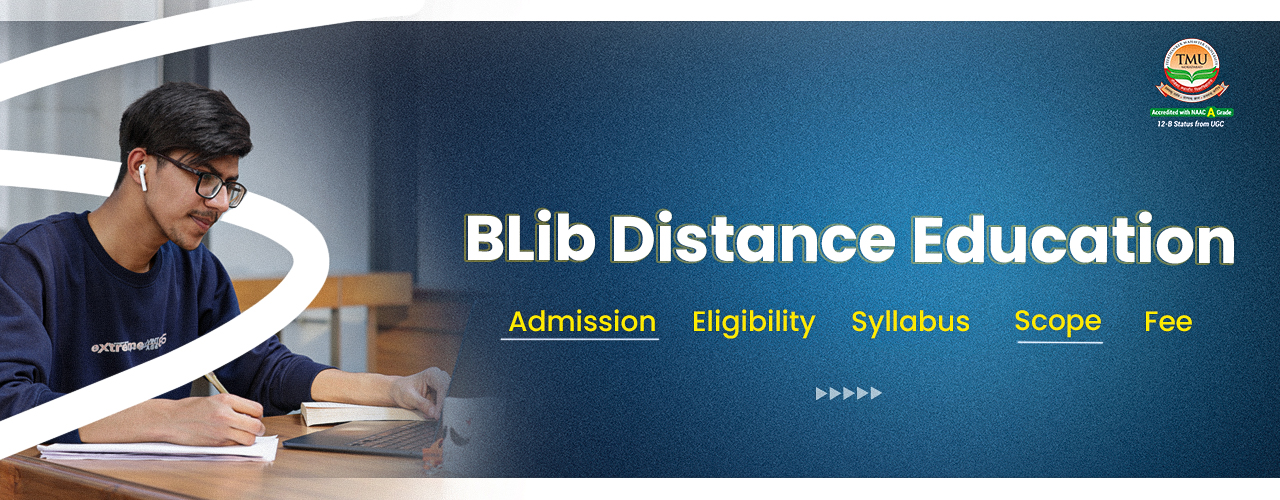B.Lib Distance Education: Admission, Eligibility, Fee, Syllabus & Scope
Table of Contents
BLib stands for Bachelor of Library Science. It is a one-year undergraduate course designed to equip students with the knowledge and skills necessary to work in libraries and information centres.
Generally, a 10+2 (Intermediate) degree from a recognised board is required to qualify for a BLib program. While there's no strict age limit, most universities have a minimum age requirement.
Admission to BLib programs often involves entrance exams. Many universities conduct their own specific entrance tests. Additionally, some universities may accept scores from common entrance exams like the Common University Entrance Test (CUET).
What is BLib Distance Education?
The BLib Distance Education program is designed to teach students about managing, organising, and disseminating information in libraries.
Unlike traditional on-campus programs, BLib Distance Education allows learners to study remotely, offering flexibility and accessibility to those who may be balancing work or personal commitments
Teerthanker Mahaveer University
Apply for Admission
Click Here To Apply for Admission
BLib Full Form
BLib stands for Bachelor of Library Science. It's a one-year undergraduate course that equips students with the knowledge and skills needed to manage libraries and information centres. This includes skills in cataloguing, classification, information retrieval, digital library management, and more.
Eligibility Criteria for BLib Distance Education
Before applying, ensure that you meet the eligibility requirements for this program. The essential criteria include:
- Educational Qualification: Generally, candidates must have a bachelor’s degree from a recognized institution in any discipline.
- Minimum Marks: Some universities may require a minimum percentage in previous studies, often around 45-50%.
- Age Limit: While most universities don’t impose an age limit, it’s best to verify with the specific institution.
Admission Process
The admission process for BLib Distance Education is straightforward. Here’s what you need to know:
- Application Submission: Start by visiting the chosen university's official website and filling out the online application form.
- Entrance Exams: Some universities may require an entrance exam, while others may have a merit-based selection.
- Document Verification: Ensure you have relevant documents like mark sheets, ID proofs, and photographs ready for submission.
- Payment of Fees: Once selected, you must pay the fees to secure your admission.
Fee Structure of BLib Distance Education
The fee structure for a BLib Distance Education courses can vary based on the university:
- Average Fees: Typically, the course fees range from INR 10,500 to INR 40,000 per year, depending on the university.
- Payment Options: Some universities offer flexible payment schedules, including instalment options, making the program affordable for more students.
Syllabus and Subjects in BLib Distance Education
The curriculum for BLib Distance Education is designed to provide a solid foundation in library science and information management. Core subjects include:
- Library Management: Covers the principles of managing a library, including administrative and organizational tasks.
- Information Technology in Libraries: Teaches the use of digital tools and systems for cataloguing and managing resources.
- Classification and Cataloguing: Focuses on organizing materials and creating records for easy access.
- Library and Society: Explores the relationship between libraries and communities.
- Research Methodology: Develops skills in conducting and evaluating research.
Duration of the BLib Distance Education Course
Typically, the course duration for BLib Distance Education is one year. However, the flexibility of distance education often allows students to extend this time frame if necessary.
Mode of Learning in BLib Distance Education
The learning mode is primarily online, providing flexibility and convenience for students. Key features include:
- Study Materials: Most institutions provide digital study materials and access to online libraries.
- Interaction with Instructors: Universities offer virtual meetings and discussion forums to interact with faculty.
- Assessments: Online quizzes, assignments, and exams are commonly used to gauge students' progress.
Advantages of Pursuing BLib Distance Education
Here’s why BLib Distance Education is a preferred choice for many:
- Flexibility: Perfect for working professionals and those with family obligations.
- Cost-Effective: Generally more affordable than on-campus programs.
- Self-Paced Learning: Allows students to study at their own pace, making it easier to balance with other commitments.
Challenges in BLib Distance Education
While distance education offers several benefits, there are challenges to consider:
- Self-Motivation: Requires discipline and time management skills.
- Limited Practical Training: The lack of hands-on training can be a drawback.
- Reduced Networking: Limited face-to-face interaction with peers and mentors.
Career Opportunities After BLib Distance Education
Graduates of BLib Distance Education programs are prepared for various roles in library science and information management. Potential career paths include:
- Library Assistant: Supports librarians in managing daily tasks and organizing resources.
- Archivist: Preserves historical documents and archives.
- Information Manager: Manages information systems in public or private organizations.
Scope of BLib Distance Education
The demand for library professionals is on the rise, thanks to digital transformation and the need for efficient information management. A BLib degree opens opportunities in both public and private sectors, from schools and universities to government institutions.
Job Prospects in Different Sectors
Graduates can find job opportunities in various sectors:
- Government Libraries: Employment in public libraries, municipal libraries, and national archives.
- Corporate Sector: Information management roles in corporate research centers.
- Research Organizations: Libraries within scientific and academic research institutions.
Salary Potential After BLib Distance Education
Salary packages for BLib graduates depend on experience, location, and organization. Here’s an overview:
- Entry-Level Salaries: Fresh graduates can expect starting salaries ranging from INR 24,000 to INR 56,000 per year.
- Experienced Professionals: With experience, salaries can increase significantly, especially in specialized or high-demand roles.
Conclusion
Pursuing a BLib Distance Education can be an ideal pathway for those passionate about library science and information management. With flexibility, affordable fees, and growing career opportunities, this program offers a balanced blend of education and convenience. Whether you’re a working professional or a recent graduate, BLib Distance Education can pave the way for a rewarding career in library science.
FAQs
Q1: What is the difference between BLib regular and distance education?
Ans: BLib regular is an on-campus program, while distance education is conducted online, offering flexibility for students with other commitments.
Q2: Can I pursue BLib Distance Education after a bachelor’s degree in any discipline?
Ans: Yes, most programs accept candidates with a bachelor’s degree in any field.
Q3: How long does it take to complete BLib Distance Education?
Ans: Typically, it takes one year, but some programs offer extended timelines.
Q4: Are there any internships or practical training in BLib Distance Education?
Ans: Some universities offer virtual internships, though hands-on training may be limited.
Q5: What is the salary range after completing BLib Distance Education?
Ans: Starting salaries range from $4,000 to $6,000 annually, with potential growth as experience increases.















